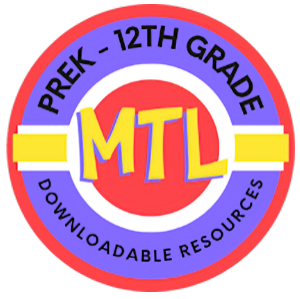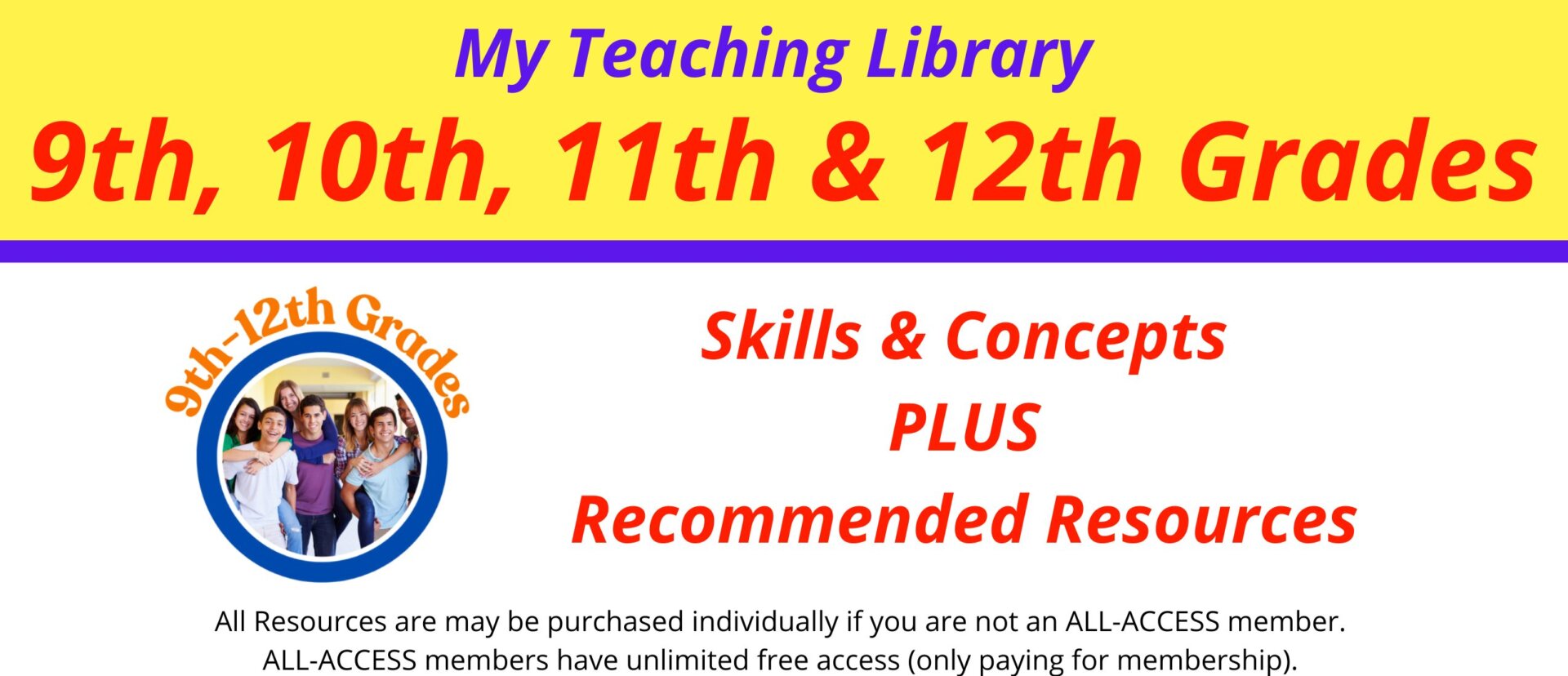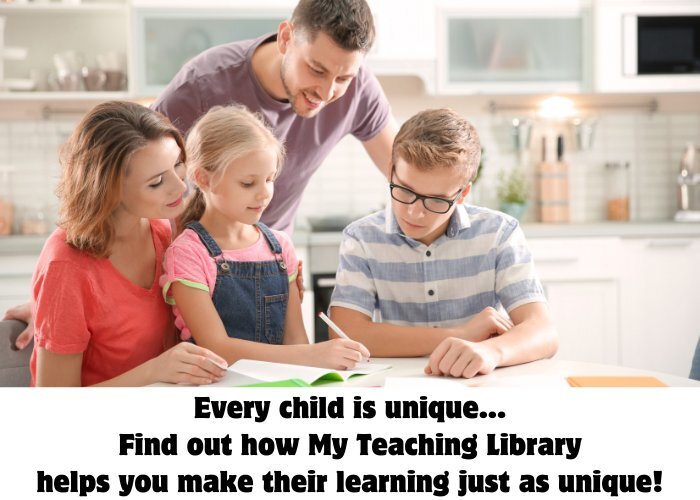Language Arts
Suggested Resources:
English Curriculum
9th – English 1 – Student Edition | English 1 – Teacher’s Guide
10th – English 2 Student Edition – Part 1 | English 2 Student Edition – Part 2 | English 2 Teacher’s Guide
11th – English 3 Student Edition | English 3 Teacher’s Guide
12th – English 4 Student Edition | English 4 Teacher’s Guide
Vocabulary Studies
Latin Word Roots | Reference
100 Vocabulary Words Every High School Student Should Know (1 Semester unit)
1000 Vocabulary Words with Definitions for High School
Word Parts Dictionary
Modern Vocabulary for High School
Literature Studies
For use with any novel: Generic Novel Study Unit Activities | Reading Comprehension
>> British Literature study (Typically for 10th grade)
Novel Studies:
- Pride and Prejudice (Jane Austen) – .pdf book
– Pride and Prejudice Novel Study
– Pride and Prejudice Vocabulary Study
– Pride and Prejudice | Assessments - The Hobbit – Novel Study
Books (.pdf)
- Sense and Sensibility (Jane Austen)
- Jane Eyre (Charlotte Bronte)
- Through the Looking Glass (Lewis Carroll)
- Alice’s Adventures in Wonderland (Lewis Carroll)
- Great Expectations (Dickens)
- Oliver Twist (Dickens)
- A Tale of Two Cities (Dickens)
- The Jungle Book (Rudyard Kipling)
Literary Companions for British Literature
- John Milton – Literary Analysis
- George Orwell – Literary Analysis
- Shakespeare – Biography and Literary Analysis
>> Materials for American Literature (Typically for 11th grade)
Novel Study
Literary Companions for American Literature
- Mark Twain – Literary Companion
- Ernest Hemingway – Biography and Literary Analysis
- Robert Frost – His Life and Literary Works
- Herman Melville – Biography & Literary Analysis
- Emily Dickinson – Literary Companion
- William Faulkner – Biography and Literary Analysis
>> Materials for World Literature (Typically for 12th grade)
World Literature | Part 1
World Literature | Part 2
World Literature | Part 3
High School World Literature (Bundled)
Additional materials: My Teaching Library has a large library of .pdf books
The following are expected outcomes for High School Students:
1. Use agreed-upon rules for formal and informal in small groups.
2. Pose questions, listen to the ideas of others, and contribute their own information or ideas in group discussions and interviews in order to acquire new knowledge.
3. Make oral presentations that demonstrate appropriate consideration of audience, purpose, and the information to be conveyed.
4. Acquire new vocabulary and use it correctly in reading and writing.
5. Describe and analyze the grammatical structure of the English language and the standard English conventions for sentence structure, usage, punctuation, capitalization, and spelling
6. Describe and analyze how oral dialects differ from each other in English, how they differ from written standard English, and what role standard American English plays in informal and formal communication.
7. Describe and analyze how the English language has developed and been influenced by other languages.
8. Decode accurately and understand new words encountered in their reading materials, drawing on a variety of strategies as needed, and then use these words accurately in speaking and writing.
9. Identify the basic facts and essential ideas in what they have read, heard, or viewed.
10. Identify, analyze, and apply knowledge of the characteristics of different genres.
11. Identify, analyze and apply knowledge of theme, fiction, nonfiction, and poetry and provide evidence from the text to support their understanding.
12. Identify and analyze how an author’s choice of words appeals to the senses, creates imagery, suggests mood, and sets tone.
13. Compare and contrast similar myths and narratives from different cultures and geographic regions.
14. Interpret the meaning of literary works, non-fiction, films and media by using different critical lenses and analytic techniques.
15. Plan and present effective dramatic readings, recitations and performances that demonstrate appropriate consideration of audience and purpose.
16. Write compositions with a clear focus, logically related ideas to develop it, and adequate detail.
17. Select and use appropriate genres, modes of reasoning, and speaking styles when writing for different audiences and rhetorical purposes.
18. Demonstrate improvement in organization, content, paragraph development, level of detail, style, tone and word choice in their compositions after revising them.
19. Use knowledge of standard English conventions to edit their writing.
20. Use self-generated questions, note-taking, summarizing, precise writing, and outlining to enhance learning when reading or writing.
21. Use open-ended research questions, different sources of information, and appropriate research methods to gather information for their research projects.
22. Develop and use appropriate rhetorical, logical, and stylistic criteria for assessing final versions of their compositions or research projects before presenting them to varied audiences
23. Obtain information by using a variety of media and evaluate the quality of material they obtain.
24. Explain how the techniques used in electronic media modify traditional forms of discourse for aesthetic and rhetorical purposes.
25. Design and create coherent media productions with a clear controlling idea, adequate detail, and appropriate consideration of audience, purpose, and medium
9th Grade Focus
Special attention should be given to library and study skills. By building on the tools of reading, writing, speaking, listening, and thinking (skills presented in both the elementary and middle school grades), the student should be provided with continued opportunities for developing these communication skills, while focusing on analysis of the short story, novel, essay, drama, and poetry.
10th Grade Focus
The focus is on British literature. Through discussion, readings, informal and critical essays, independent research, etc., students explore the major themes that the authors themselves explored. From this concentration on British literature, it is expected that students will develop higher critical/analytical reading and thinking skills in order to evaluate data and to respond appropriately.
11th Grade Focus
The focus is on American literature. Students should develop a deeper knowledge and greater respect for the American heritage: its history, its complexity and its literary contributions. Thematic units (e.g., the Puritan conscience, the American search for identify, the American ideal, etc.) should be studied through representative writers. Critical analysis and the essay comprise the principal amount of writing.
12th Grade Focus
The focus is on World literature, reading in mythology and epic lore explores the roots of literary tradition. A survey of world literature from the fourteenth through the twentieth centuries affords students the opportunity to challenge the thinking of the great minds of Western civilization. Discussions should be based on textual analysis and related material. The focus for the research paper originates from course readings.
Most common sequences are as follows:
Sequence 1:
9th Grade: Algebra 1
10th Grade: Geometry
11th Grade: Algebra 2
12th Grade: Optional Elective (Pre-Calculus, Advanced Algebra/Trigonometry, Computer Programming, Probability & Statistics, Discrete Mathematics)Sequence 2:
9th Grade: Geometry
10th Grade: Algebra 2
11th Grade: Pre-Calculus
12th Grade: Calculus
Suggested ALGEBRA Teaching Materials:
Visual Algebra Glossary
Algebra 1 | Student Edition
Algebra 1 | Teacher Edition
Also available:
So You Want to Understand…Algebra?!
A First Book in Algebra
Elementary Algebra
High School Algebra
Suggested Geometry Teaching Materials:
High School Geometry
30 Minutes a Day…Geometry
Suggested Calculus Teaching Materials:
Suggested Advance Mathematics Teaching Materials:
Science
Most common sequences are as follows:
Sequence 1:
9th Grade: Introductory Physics
10th Grade: Biology
11th Grade: Chemistry
12th Grade: Optional Elective (Advance Physics, Advanced Biology, Anatomy & Physiology, Environmental Science, Forensics, Introduction to Engineering)Sequence 2:
9th Grade: Biology
10th Grade: Chemistry
11th Grade: Physics
12th Grade: Optional Elective or AP Course
Suggested Resources
Science Lab Report Worksheet and Rubric
Introductory Physics (Suggested for 9th or 11th)
Physics
Physical Science – Student Edition
Physical Science Teacher’s Guide
Biology (Suggested for 9th or 10th)
General Biology – Unit 1
General Biology – Unit 2
General Biology – Unit 3
General Biology – Unit 4
General Biology – Unit 5
General Biology – Unit 6
General Biology – Unit 7
High School Biology – Student Edition
High School Biology – Teacher Guide
Chemistry (Suggested for 9th or 11th)
Physical Science – Student Edition
Physical Science Teacher’s Guide
Social Studies
(Suggested Courses by Grade)
Grade 9 – World History 1
World History 1 | Student
World History 1 | Teacher’s Guide
Students will be able to:
- – Examine eight major world religions and their importance in history.
- – Explore the rise and fall of empires.
- – Describe the development of European political, religious, social and economic institutions.
- – Detail European exploration and colonization of the Americas, Asia, and Africa.
- – Identify the achievements and contributions of Asian, African and American civilizations.
- – Trace the development of revolutions in thought and government.
Grade 10 – World History 2
World History 2 | Student
World History 2 | Teacher’s Guide
Students will be able to:
- – Detail the technological innovations and new economic developments of the Industrial Revolution and the new political, economic, and scientific ideas and growth of popular culture.
- – Describe the revolutionary and reform movements the reshaped the politics of Europe and the Americas in the 1800’s.
- – Explain how nationalism transformed many countries throughout the world.
- – Discuss the effects of European and American Imperialism in Asia, Africa, and Latin America and also the legacy of colonial rule.
- – Identify the causes, events, and results of World War I.
- – Trace the growth of fascist and Communist dictatorships in Italy, Germany, and the Soviet Union.
- – Explain the causes of World War II and the major political realignments that followed the war.
- – Summarize the causes and impact of the cold war.
- – Discuss conflicts in Asia and the region’s emergence as an economic powerhouse.
- – Examine the move toward globalization with a focus on the Middle East and Latin America
Grade 11 – United States History
American History 1 | Student
American History 1 | Teacher’s Guide
Students will be able to:
- – Identify the major components of the United States Constitution.
- – Describe the period of Reconstruction and its long-term effects on the nation and its peoples.
- – Describe the impact of Plessy v. Ferguson and Brown v. Board of Education on American society.
- – Detail the struggles of Native Americans during the late 19th century.
- – Describe the elements and impact of industrial expansion in the US.
- – Explain the advent of the corporation, banking, and the stock exchange.
- – Identify the role of immigration on the growth of American cities.
- – Discuss key events in the labor movement.
- – Identify the major events of the Spanish American War and the Progressive movement.
- – Explain the causes and consequences of World Wars I and II.
- – Summarize key leaders and goals of the women’s suffrage movement.
- – Analyze the events of the 1920’s, including the Harlem Renaissance.
- – Describe the advent and effects of the Great Depression and FDR’s New Deal.
- – Analyze key issues of the 20th century, including the Civil Rights movement, Vietnam War and Cold War era.
- – Explain the climate of the post-Cold War era and the New World Order.
- – Discuss issues in contemporary American life.
Grade 12 – Elective of choice
American History 2 | Student
American History 2 | Teacher’s Guide
American Government Student Text
American Government Teacher’s Guide
Economics | Student Edition
Economics – Teacher’s Guide
Examples: Psychology, Sociology, Anthropology, Economics, any AP course
PLEASE NOTE:
If your student plans to attend a university, please check out the requirements as early as possible, preferably before 9th grade. Universities will have certain requirements requiring the addition of Arts and Foreign Languages. If your student knows what he/she would like to major in, also check for specific requirements related to specific majors.



